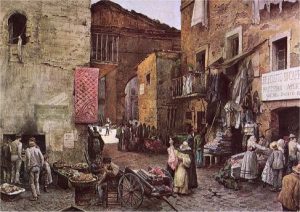The State and the Jews—Control
Jewish presence in medieval western Christendom was fostered by the lay authorities in order to stimulate the economic growth of their realms and—at the same time—to enrich their coffers. Exploitation of Jewish financial assets—often achieved with considerable help on the part of the authorities—became increasingly important as Europe, especially its western sectors, surged forward from the twelfth century onward. The first step in exploitation of Jewish assets involved securing Jewish presence. To the extent that Jewish settlement—especially the presence of the wealthiest and most mobile of the Jews—was fluid, rulers risked losing valuable Jewish revenue through relocation of Jews into alternative domains. Thus, from the late twelfth centuryon, many of the most sophisticated rulers of western Christendom sought to fix Jewish residence, through direct arrangements with the Jews themselves, through treaties with neighboring holders of Jews, and eventually through wide-ranging decrees. Slowly, Jewish mobility was in fact limited in significant ways.
This reality, in concert with some of the theological notions of Jewish servitude, gave rise to terminology of “Jewish serfdom.” To be sure, the status of Jews was quite different from and superior to that of medieval serfs. Nonetheless, the fixing of Jewish settlement did in fact diminish both the mobility and the status of the Jews of medieval western Christendom.
Images
Primary Texts
- An Agreement to Respect Mutual Rights over Jews, France 1198 Royal Document
- Wide-Ranging Agreement to Respect Mutual Rights over Jews, France 1223 Royal Document
- Royal Order to Respect Mutual Rights over Jews, France 1230 Royal Document
- Imperial Proclamation of Rights over Jews, 1236 Imperial Document
- Royal Order, England 1253 Royal Document
Secondary Texts
- S. W. Baron, A Social and Religious History of the Jews, 4-22.
- G. Langmuir, “’Judei Nostri” and the Beginning of Capetian Legislation,” Traditio 16 (1996)- 203-269.
- W. C. Jordan, The French Monarchy and the Jews, (Philadelphia- University of Pennsylvania Press, 1989) 38-45 and 93-104
What do you want to know?
Ask our AI widget and get answers from this website
